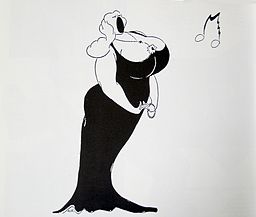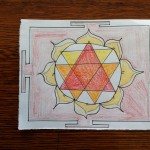I know a little something about being a student: I’ve got a high school diploma, a bachelor’s degree in history, most of a vocal performance degree, a master’s degree in religious studies, and a few years of doctoral work in theology. I’ve spent probably ten full years in voice lessons with a total of nine different teachers and I’ve spent the last 8 years studying Feri/Faerie witchcraft with a total of four teachers.
Yet, for all that studying, on my own and with teachers, I realized recently that only in the last year or so have I finally become ready to be a student. I see a lot of similarities between studying singing and studying magic, although these similarities probably apply to most forms of learning.
The most important thing I’ve learned is this: you are your own guru. Only once you trust yourself will you be able to trust your teachers. Teachers may ask you to do some silly things or give up some things you love. You have to trust that those requests are wise. I thought I trusted my teachers, but I always felt like they didn’t know the whole story, or they weren’t effective enough, or I felt bored. In some cases I look back I realize I’ve had a couple of very bad teachers, and in a few cases I see now that a couple of teachers just weren’t a good fit for me. But mostly the issues were with me: my expectations, my inability to trust myself, my fear that without teaching I wouldn’t ever be the singer I wanted to be, that I needed some one else to make me Magical and Talented.
The trifecta of natural ability, hard work, and connecting to the Current are all necessary, but relying on any one of them alone will not create a talented performer or ritualist. While a teacher can help a student tap into all three, no teacher can make anyone Amazing.
In my mid-twenties I was studying singing with a teacher in Shoreline, WA. She held a master class with Speight Jenkins, then the director of the Young Artists Program at the Seattle Opera, on what makes a successful opera singer. He said he would rather have the hard worker with some talent, than the amazingly talented singer who had never had to work to be the best. Why? Talent can be cultivated, but knowing how to persevere, to work with other people of varying abilities – these were qualities he found hard to come by in people who were always used to being better than their peers.

I have found the same thing in magical training. Some people have significant natural magical abilities and some people develop their more modest talents through hard work. A student brings her natural talent and all of her efforts – a teacher cannot provide those things. Talent, effort, and training allow a person to tap into the magical flow of the moment. (For the record: yes, there are some amazing talents in all fields who have never had a lesson in their life, just as there are plenty of crazy talented people who also work really hard at their craft.) But teachers are important guides. They know techniques. They provide feedback. They introduce students to new genres, producers, gods, and forms. They can protect students from pitfalls.
Studying with a teacher often means starting with basics, whether you’ve never studied with a teacher before or have had ten. One thing I’ve found is that there is no advanced work without basics. Some teachers just want to know that you have a foundation in the basics, others want you to know their specific techniques.
Technique is important. It provides a foundation for practice, a variety of tools for greater flexibility, and safe guards for the student. No matter how talented, an 11 year old just should not sing “O Mio Babbino Caro.” Neither should a new student call up the cthonic gods of the underworld, even if they can. There’s a reason those things are saved for later in the training. Beginning o young students don’t typically have the control, discernment, emotional depth, or physical endurance to handle the work – or the consequences. While all the technique and basics can get boring, it’s important to remember that a magician or musician can’t effectively break the rules without mastering them first. You can’t go off script if you never learned the script to begin with.
One saying I hear over and over in the spiritual world is ‘When the student is ready, the teacher will appear.’ Sometimes this sounds like an empty platitude to the student who hasn’t yet found a teacher, or faces obstacles in obtaining one, but there is a nugget of truth in here. Waiting for the right teacher is not passive, like waiting for the bus. When the teacher does appear, you will not be an empty vessel, filled up and instantly made Magical, Awesome, Profound, or Gifted. Yes, waiting is important – but this is an active waiting. Ideally the student is preparing himself. Reading, reflecting, attending open rituals in his area (if there are any), practicing basics – all of these things make a student more ready to tackle the bigger work. A singer would never just sit mute and wait to be cast in a show. A singer might not be singing arias, but likely they are singing along to the radio, learning tunes that excite them, listening to great singers, attending shows, maybe joining a chorus. All of those things prepare a student for more serious training. This is what I’ve done in between Feri and singing teachers, and what I’m doing while I wait for a Tantra guru as well.

What are some ways a student might make the most of teaching?
*Don’t be afraid to shift or explore new genres. You may start out with classical voice lessons and discover that your voice is more suited for blues. The basics of opera will serve you well. Just like you might start out in Wicca only to realize that Druidry is where your heart lies. The basics you’ve learned will likely translate. Strong foundations will not be wasted!
*Take initiative: in your practice, in your training, in your relationships. Often the dream is to find a teacher who is more than just a depositor of lore or skills, but is also a friend and mentor. This takes two. You are not a servant, but an active partner in your own learning. Ask questions, reach out, talk to the teacher about what is and is not working.
*That said, teachers are not mental health professionals. They may be able to provide wise council and support, but they are not substitute parents or therapists, as much as we might wish them to be. It is important to be clear about what you want and need from the teaching relationship.
*Be prepared to spend a lot of time on breath work. Breath work seems to be the core for everything. Everything I’ve studied outside of books has started with breath work: singing, martial arts, magic, yoga. Breath work is the heart of it all.
*Don’t be a flake. Show up on time to lessons. Make your learning a priority. It’s not just a hobby for your teachers, so respect their time and preparations. Same for your practice time: honor and respect the time and effort you put in. Showing up on time and being mentally present for lessons or your own practice doesn’t just respect the teacher, it respects your own efforts.
In the end, only you can do the work. Only you can sing the song. Only you can reach out to the gods. A teacher can tell you all sorts of things. A teacher can help you get auditions, invite you to ritual, teach you techniques, but only you can tap in to the Current.











